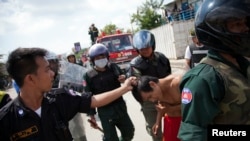A leading U.S.-based rights group said Thursday the Cambodian government is still failing to protect workers in the country’s vital garment sector. In a new report, Human Rights Watch says Cambodia’s mainly female workforce has to contend with an array of abuses, including forced overtime, harassment and a lack of help at factories for pregnant women.
Among the slew of problems facing workers in Cambodia’s garment sector, says Aruna Kashyap, senior researcher with Human Rights Watch, are forced overtime, discrimination against pregnant women, and the repeated use by factories of short-term contracts to circumvent labor law provisions that are designed to protect workers.
Kashyap, who wrote the report - called “Work Faster or Get Out” - says blame for the failings rests with the Cambodian government, in particular the Ministry of Labor.
Human Rights Watch says labor ministry inspectors regularly take bribes from factory owners to ignore breaches of the law. It describes the inspection regime as “fundamentally broken.”
“Our top recommendation to the Cambodian government would be that they need to demonstrate the political will to enforce the Labor Law and hold factories systematically accountable when they’re not complying with the Labor Law - because they have a strong Labor Law,” says she.
Kashyap highlighted the need to weed out corruption among labor department inspectors, saying that is key to improving working conditions in Cambodia’s factories.
Key sector
Garment manufacturing is central to Cambodia’s economy. The sector is not only the largest employer, with around 700,000 workers, most of whom are women, it is also the country’s key foreign exchange earner, worth more than $5 billion in annual exports, mainly to the United States and the European Union.
Dozens of well-known Western brands source from Cambodia, paying factories based in the country to manufacture their clothing.
The sector relies on household names such as H&M, Adidas, Gap and Armani, but its image has suffered in recent years with labor disputes and the bullying of independent unions.
That culminated in early 2014 when Cambodian authorities shot dead at least five workers during unrest over the minimum wage and working conditions.
Human Rights Watch says brands must also take action. Kashyap says a few appear to be doing so, adding that H&M, Adidas and Gap were particularly responsive to the report’s findings. However others, including Armani, failed to respond.
Kashyap says that is not good enough, particularly after the 2013 Rana Plaza factory collapse in Bangladesh when more than 1,000 workers died.
“The first recommendation to brands is that they need to make their supplier list public,” says Kashyap.
That’s important because many factories supplying Western brands secretly outsource work to other factories that don’t get inspected, and where labor conditions are typically far worse.
“Only a handful of brands are publicly disclosing the names of their suppliers. There can be no compromise on this. I think post-Rana Plaza we’ve seen the cost of non-transparency and I don’t think brands can any more afford to say that they do not want to disclose their supplier lists because of competitive advantage or business secrets,” says Kashyap.
In addition, Human Rights Watch wants brands to do a better job monitoring their supply chain.
In a statement, Swedish retail giant H&M says it agrees with many of the report’s findings, including the negative consequences of the abuse of short-term contracts, and adds that it is taking measures to get its suppliers to cease the practice.
H&M was also among the first to publish a list of its Cambodian suppliers - that makes it easier for any unauthorized subcontracting by suppliers to be reported.
But many other brands are doing little or nothing. Human Rights Watch admits that the problems it has found are hardly new - so until the government chooses to enforce its own laws, conditions for workers will continue to fall short.




